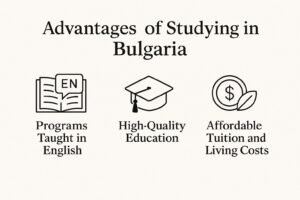Cost of Living in Bulgaria for International Students
Monthly Living Expenses (including accommodation):
- Approximately €500 – €800 per month.
- Detailed Living Costs:
- 1. Student Accommodation:
- University dormitories: €50 – €100 per month.
- Private housing: €200 – €400 per month.
- 2.Transportation:
- Monthly student transportation pass: €10 – €20.
- 3.Food:
- Monthly food expenses: €150 – €250.
- Dining out at a regular restaurant: €5 – €10 per meal.
- 4,Utilities (electricity, water, internet):
- Approximately €50 – €100 per month.
- 5 Health Insurance:
- Approximately €10 – €20 per month (mandatory for students).
- 6 Books and Study Materials:
- Approximately €30 – €50 per semester.
- 7 Entertainment and Social Activities:
- Approximately €50 – €100 per month.
- Monthly Expenses Summary:
- Minimum: €500
- Maximum: €800
- Note: Bulgaria is considered one of the most affordable European countries for living, making it an attractive destination for international students.
Requirements to Study in Bulgaria for International Students
1. University Admission:
- Students must obtain an acceptance letter from a recognized Bulgarian university.
- The application requires a copy of previous academic certificates (high school diploma or bachelor’s degree).
2 Language Proficiency:
- Most universities offer programs in Bulgarian, English, or French.
- For English programs, a certificate such as IELTS or TOEFL is required.
- For Bulgarian programs, students must attend a preparatory year to learn the language.
3.Student Visa (D Visa):
- Students must apply for a long-term visa (D type) from the Bulgarian embassy.
Required documents:
- University acceptance letter
- Valid passport
- Proof of financial resources to cover living and study expenses
- Health insurance covering the stay
4. Proof of Financial Resources:
- A bank statement showing approximately €4,000 – €5,000 to cover expenses is required.
5. Health Insurance:
- Students must purchase health insurance for the entire duration of their stay in Bulgaria.
6. Accommodation Proof:
- Students must provide a rental contract or proof of accommodation in Bulgaria.
7.Certificate Verification:
- All academic certificates must be verified by the Ministry of Foreign Affairs and translated into Bulgarian.
8. Application Fees:
- Most universities charge a registration fee ranging from €100 to €200.
Quick Summary of Required Documents:
- 1. Acceptance letter
- 2. Valid passport
- 3. Bank statement
- 4. Health insurance
- 5. Accommodation proof
- 6. Language certificate (if applicable)
- 7. Verified and translated academic certificates
Note: Bulgarian universities offer diverse programs in medicine, engineering, and humanities at relatively low tuition fees compared to Western Europe.
Tuition Fees in Bulgarian Public Universities
1. Studying in Bulgarian:
- Tuition fees are lower when students choose programs taught in Bulgarian.
- Medical programs (such as general medicine and dentistry) cost between €3,500 and €8,000 per year.
- Engineering and science programs range from €2,500 to €4,000 per year.
- Literary and social sciences programs (e.g., economics and law) cost between €1,500 and €3,000 per year.
2. Studying in English:
- Tuition fees for programs taught in English are higher than those in Bulgarian.
- General medicine costs approximately €7,000 to €10,000 per year.
- Dentistry costs approximately €8,000 to €10,000 per year.
- Engineering and science programs range from €4,000 to €6,000 per year.
- Literary and social sciences programs cost approximately €3,500 to €5,000 per year.
Note:
- The preparatory year to learn the Bulgarian language costs between €2,500 and €3,500.
- Medical programs are the most expensive, while literary and social sciences programs are more affordable.
- Bulgarian universities offer high-quality programs with broad recognition in Europe, making them an attractive destination for international students.


 العربية
العربية Türkçe
Türkçe







